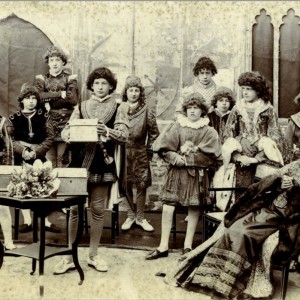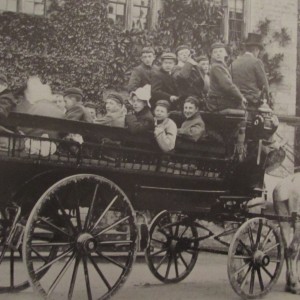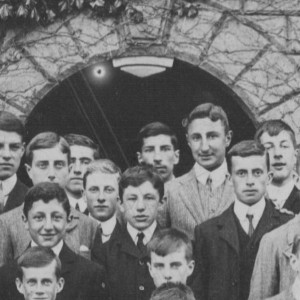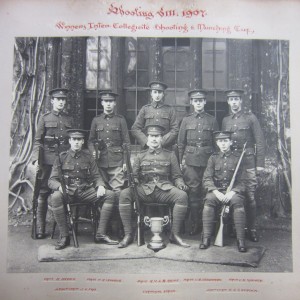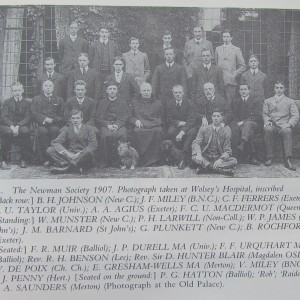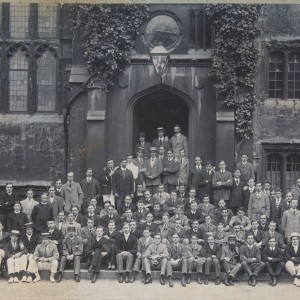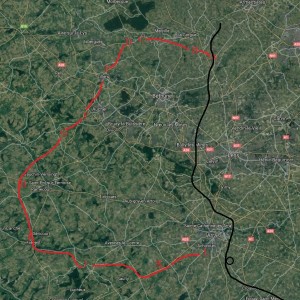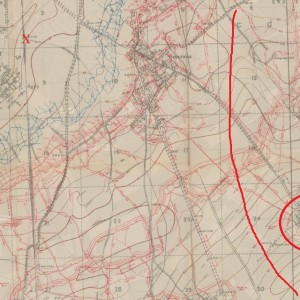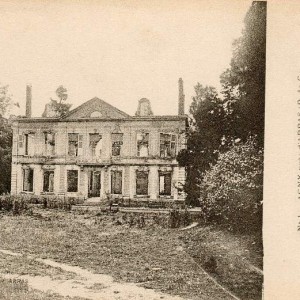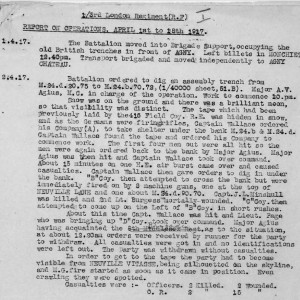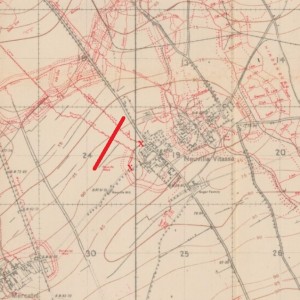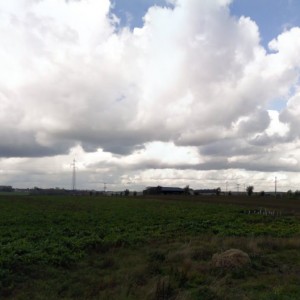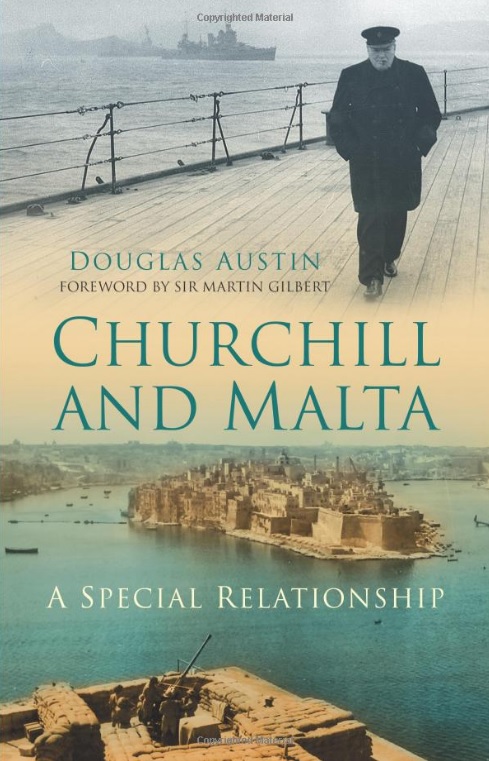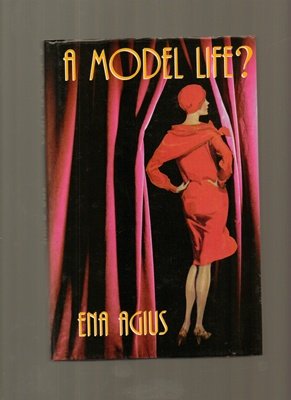School and University
Alfred was born 9th March 1887 at the family home in Belsize Park Gardens,Hampstead –
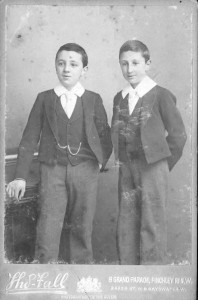
In 1896 Alfred began his formal education at St Augustine’s School, Ramsgate, following in the footsteps of his uncle, Dom Ambrose, and older brothers Edward and Joseph. Alfred and Joseph acted in an acclaimed production of The Merchant of Venice, which was reported in The Tablet in March 1898.
In 1900, when Joseph finished his schooling, their father decided to move Alfred, still only 13, to Downside School, together with his younger brothers Edgar and Tancred. Thus started the long family connection with Downside – lasting over 100 years and 4 generations to date. Younger brothers Arthur and Dickie were soon to follow. Alfred could uniquely claim to have been educated by the monks of both Ramsgate and Downside.
Alfred left Downside in 1905 and went up to Exeter College, Oxford, where he studied for a Pass degree in a range of subjects, as most undergraduates did at that time. He passed his intermediate exams in Latin, Greek and Divinity in 1906; French, Legal Study and English History in 1908 , and finally took his BA in January 1909. These were still early days for Roman Catholics taking degrees at Oxford and he fully involved himself in the life of the Catholic Chaplaincy (founded in 1896) and the Newman Society. Alfred also joined the University Officer Training Corps and in 1907 was a member of the College VIII that won the Shooting and Marching Cup.
School and University:-
3rd Battalion London Regiment and WW1
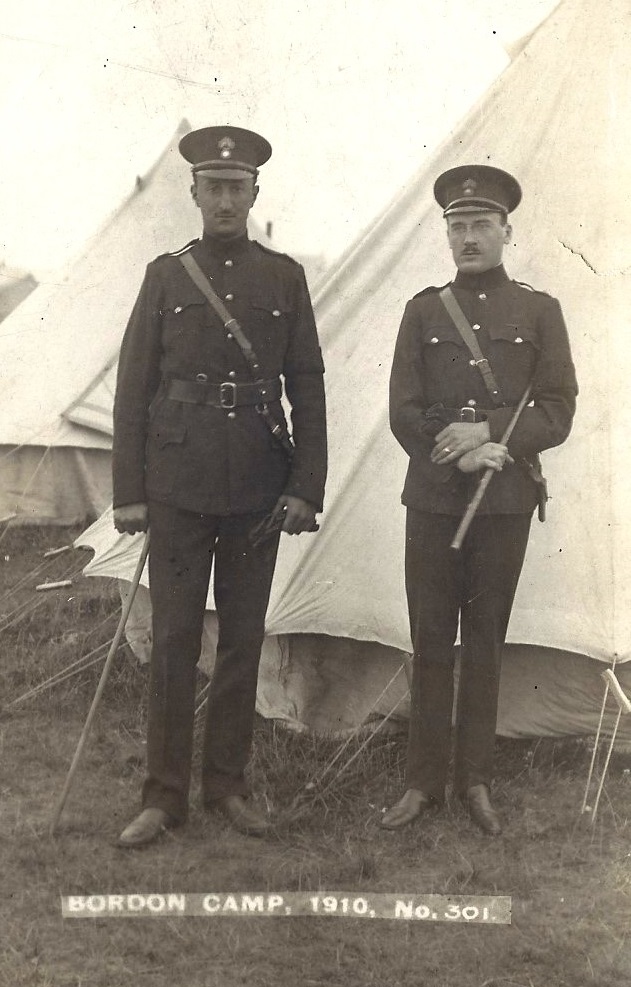
In 1909 Alfred started work in the family coal and shipping business (Ed T Agius Ltd) in the London and Newcastle offices. While still at Oxford, he joined the 3rd (City of London) Battalion, the London Regiment (Royal Fusiliers) –
The battalion met regularly in the drill hall in Edward Street , St Pancras, and had summer training camps at a number of locations. At the start of August 1914 Alfred, Arthur and their fellow Territorials were busy preparing for their annual summer training camp in Swanage, Dorset. Overnight they were mobilised, and by 3rd August found themselves, with the 1/3rd Battalion, guarding a section of the Basingstoke to Eastleigh railway line. Alfred’s company was guarding a section between Micheldever and Basingstoke, while Arthur’s was based at Winchester. In Arthur’s letter of 11th August he wrote that ” After supper Major Samuel and I went up to Micheldever – where Gilbert is – by train. We got out there and walked along the track to Basingstoke. We left about 9.35 and didn’t get to Basingstoke until 2.45: so you see it was a pretty long trek. The going by the railway was very rough and we had to traverse 3 tunnels. On the way we had to pass Alfred’s section: we saw him – he was looking rather tired. “.
For the next 9 months, until mid-May 1915, Alfred and Arthur served together , with Alfred being the senior – a Captain to Arthur’s Lieutenant.
Malta Homecoming
 In September the Battalion sailed from Southampton, bound for Malta. They were based in and around Imtarfa Barracks until the beginning of January 1915. This was their first overseas posting – the Territorials were to relieve the regular British Army troops (for active service elsewhere) and continue with basic training.
In September the Battalion sailed from Southampton, bound for Malta. They were based in and around Imtarfa Barracks until the beginning of January 1915. This was their first overseas posting – the Territorials were to relieve the regular British Army troops (for active service elsewhere) and continue with basic training.
By 1914 a number of Alfred’s older sisters had married Maltese gentlemen and were well and truly settled on the island: brothers-
Arrival on the Western Front
In September a 2nd line battalion had been raised so Alfred and Arthur’s was now designated the 1/3rd London Battalion , while youngest brother Richard joined the new 2/3rds. The 1/3rd Battalion sailed from Malta on 2nd January 1915 in the RMSP “Avon”. They arrived safely at Marseilles on 5th and finally reached Etaples Camp in the north of France around the 9th –
As Alfred and Arthur said their reluctant farewells to family and friends in Malta, the youngest brother Richard sailed into Valletta harbour with the 2/3rd Londons. He had recently obtained his army commission, having left Downside School in the summer of 1914. At just 18, Richard’s war initially took him in a completely different direction to his four elder brothers –
Neuve-Chapelle , Aubers Ridge and Festubert
Alfred and Arthur’s first action was The Battle of Neuve-Chapelle which started on 10th March 1915, the day after Alfred’s 28th birthday. The brothers were in different companies (Alfred in ‘B’ and Arthur in ‘C’) and their paths crossed infrequently. Arthur wrote in the days before the battle (5th March) ” I was firing on a small range we’ve made here yesterday afternoon when, just as we were finishing Alfred turned up and wanted me to go along with him to tea & dinner! I hadn’t seen him since Vieille Chapelle about a fortnight ago – so I went up with him. He is in very comfortable billets with Sammy who is commanding his Company. He gave me a lot of news & some old letters. He seems to have had a quiet time where he was when up in the trenches. We had a wonderful dinner. Pot au feu, Roast Chicken & Fried Potatoes & Omelette au Rhum, Coffee & Cigars! Alfred had had 200 Cigarettes sent to him by Harry – he gave me some.”
Alfred and Arthur survived the battle but lost a number of close friends and colleagues. After the end of the war Alfred made a special effort to attend the annual Neuve-Chapelle re-union dinner. At Easter 1915 the brothers were granted leave and they went home to celebrate with the family at 3 Belsize Grove. All too soon, on 7th April, they were back with the battalion in France and made the happy discovery that brother Edgar had now joined them in the 1/3rds. For the next 6 weeks the 3 brothers were stationed together, and Arthur’s letters tell of a number of occasions when they were able to meet for dinner.
Alfred, Edgar and Arthur all saw action in the attack on Aubers Ridge (9th May 1915) and the Battle of Festubert (15th-25th). In January 1916 Alfred was awarded the Military Cross (MC) for his actions at Festubert. The citation read ” For extreme gallantry in leading his company in the attack of the 16th May 1915, and subsequently on the night of the 16th/17th May, searching as far as the enemy’s wire and bringing in wounded.” (London Gazette 14th January 1916).
Edgar was wounded in the same attack (16th May) and invalided back to England. We next hear news of Alfred in Arthur’s letter of 25th May, saying that his brother was in hospital in Boulogne. Alfred was subsequently invalided back to England, leaving Arthur alone on the western front for the first time.
After convalescence Edgar and Alfred took up company commands with the newly formed 4/3rd battalion, training new officers at Hurdcott Camp in Wiltshire, providing reinforcements to the 1/3rds and 2/3rds in France. Alfred served with the 4/3rds until October 1916, and Edgar until April 1917.
Alfred received his MC from King George V at Buckingham Palace on his 29th birthday, 9th March 1916, exactly one year after his first action at Neuve-Chapelle.
Youngest brother Richard, having survived Gallipoli in 1915, joined the 4/3rds on 20th August after a period of convalescence. For a few weeks in September 1916 the three brothers, Alfred, Edgar and Richard, were together at Hurdcott Camp, Wiltshire.
Winter 1916 and a moonlit night at Agny
On 15th October 1916 Arthur wrote that a new group of officers had joined them (after the 1/3rds had lost so many in September) and was overjoyed to discover that Alfred was amongst them (and bringing a box of chocolates!). Joy was tinged with sadness because this meant Alfred could not be at Arthur’s wedding on 21st October in Hampstead. However they had a few happy days, riding the French countryside together, reflecting on all that had happened in the last year.
Arthur returned from honeymoon while Alfred was away at Army School, but in December they were together on the western front for the last time. Arthur went home on Christmas leave and never returned to France, and so at the start of 1917 it was just Alfred alone on the front line.
In February 1917 the Germans started their retreat to the more defensible Hindenburg Line. The 1/3rds were holding the line near Neuve-Chapelle almost in the same place they had been 2 years before. In March the 1/3rds were moved to a position just south of Arras, at Agny, in preparation for the spring offensive (The Battle of Arras) due to start on Easter Monday , 9th April. They were marching to their new position on Alfred’s 30th birthday 9th March.
On 2nd April Alfred was tasked with commanding an operation to dig an assembly trench in no-mans land (from which the troops could advance on 9th April). It was a moonlit light with snow on the ground and the company were easily spotted by two German machine gun posts. Alfred was shot and wounded in the chin and the battalion adjutant, Capt John Minshull , was killed. The War Diary gives a detailed description of the operation. The following account is from the memoir of Capt Wallace (also wounded) :
Two nights afterwards (April 2nd, 1917) that same Brigadier ordered us out to dig a new trench between the existing German and British Front Line. Always a hazardous undertaking this depended for success entirely on concealment. It was a bright moonlight night and snow had fallen heavily. Actually the ground consisted of a gently rising slope without even a hedge for a cover, the British Line being at the bottom of the valley, the German Line at the top. A more perfect field of fire cannot be imagined. They were on to us five minutes after we started. The Major was hit through the throat, not fatal – my dear pal Minshull got it slap between the eyes and died smiling.
Alfred found himself invalided back to England a second time, arriving in London on 20th April. For a short while none of the brothers were in France but soon Tancred (now Dom Ambrose of Downside Abbey) was commissioned as RC Chaplain. Edgar and Richard were re-assigned to the 2/3rds in France in May 1917. By June we find the three brothers, Tancred, Edgar and Richard, close enough to meet for dinner (‘in a Tent Near Mory‘).
One more time on the front line
After recuperation and a time with the reserve battalion , Alfred returned to the Western Front on 26th January 1918 joining the 2/3rd Londons (173 Brigade 58th Division) at Villers Brettoneux, where brother Edgar then was. On 28th January it was announced that the 1/3rd Londons were to be disbanded and sent to join other London battalions. 12 officers and 214 other ranks were sent to join the 2/3rd Londons and renamed simply the 3rd Battalion London Regiment , as they had been before the outbreak of war.
Alfred kept a brief diary from January to March and this records that he was again with Edgar for a few days until 6th February, and they were able to resume their pleasant dinners and rounds of bridge together. On his 31st birthday , Alfred’s diary simply notes ‘Fine Birthday. Quiet day.’
Although in reserve at first, the 3rd Londons were involved in the retreat after the start of the German’s Spring Offensive on March 21st (Operation Michael – see Tancred page), and Alfred was involved in significant actions around Villers-Brettoneux during April 1918.
In a letter dated 28th March , Alfred wrote –
Next day to my utter joy we were ordered to rejoin our own Units, so I marched my crowd off. We did 20 miles, no bad going on tired troops and without rations for two days. We got to our village at 6 pm. and I dashed off and found the A.S.C. They took me in a car to the dump and I came back triumphant, with tea, sugar, coffee, meat, bacon, bread, tinned milk, cigarettes, matches, candles etc. We found some cocoa and oatmeal in the billet, so once again life was worth living. We got to our Units to-day. Great joy. I found my valise and have had a change and a shave after a week. The Battalion has not suffered so very badly, and though forced to give ground in conformity with its flanks, gave the Bosche, Hades.
I have had some wonderful experience and seen a lot of the French. It was pathetic to see the civilians cleared out. It had been an extraordinary show all together but it is not finished yet by any means. The great thing is to keep cool and all will be well. I expect to be able to write more now. I hope you have good news of Tanc. I am very tired ……
The War Diary mentions Alfred twice more as he took command of the 3rd Londons for a few days awaiting other officers.
4th April 1918
Location: Andignicourt
“ Fusilier Battalion left at 2.30pm and proceeded to AMBLENY by march route. Weather:- very wet. On arrival at 7.30pm personnel of Battalion was returned and Battalion became “3rd London” again, under command of Major A.V.L.B. Agius, MC.
[Battalion command was taken over on 8th April by Lieut. Col. Stephen Chart]
8th May 1918
Location: Molliens-Au-Bois
“Lt Col Chart DSO returning to command the 12th Battalion London Regiment
Major A.V.L.B. Agius took command of the Battalion.
Battalion moved off at 10 AM and proceeded via MONTIGNY and BEHENCOURT to a wood E. of BEHENCOURT , arriving 12 noon.
Battalion in tents and bivouacs: weather fine and sunny.”
[Battalion command was taken over on 11th May by Lieut. Col. S. E. Sandars]
The Army Lists indicate that Alfred returned to England in August 1918 and is noted in November, at the armistice, to be Major and 2nd in command of the reserve battalion.
He was able to join Arthur and Edgar and the remainder of the 3rd Londons in the victory parade through London on 19th July 1919.
… and later
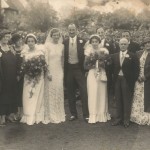
Alfred worked in the family business for a while after the war. His father, Edward Tancred Agius, died in September 1924 and the company was wound up a few years later. Alfred continued to live at No 3 Belsize Grove and for a few years his brother Joseph and family were also living there on the top floor. The Mater and sister Daisy moved to Malta in 1931, while Joseph and his family moved out to Edgware. The family home of 3 Belsize Grove was sold.
Alfred stayed with the 3rd London Regiment and on 19th March 1922 was promoted to Lt.Colonel. (LG 19/05/22)
Alfred married Ena Hueffer on 4th October 1934 with his nieces Marie and Sue as bridesmaids.
Alfred became Trade Commissioner for Malta ( at Malta House, Regent St, London) in 1934 and, in 1942, helped to provide relief funds to Malta, where his sisters and their families had lived through the most intensive bombing of WW2. Douglas Austin’s “Churchill and Malta” notes “In May 1946, Churchill received a letter from Lt.-Col. Agius, Trade Commissioner at the Malta Government Office in London, asking if he would be prepared to accept a gift from a Maltese citizen. Lt.-Col. Agius wrote that Mr. Edward Ceravolo wished to present a piece of Maltese silver to Mr. Churchill ‘whom he considers the saviour of the world from slavery and paganism.’ Churchill said he would be greatly honoured’ by such a gift.”
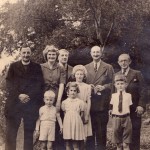
The London Gazette of March 1942 notes that “Lt. Col. A. V. L. B. Agius. MC. T.D. having attained the age-limit (55) relinquishes his commission 9th March 1942 and retains his rank”.
Of the 4 brothers who survived being on the front line he was the second to pass away on 28th November 1969 aged 82, Edgar having died earlier that year. Dom Ambrose died at Ealing Abbey on 3rd March 1978 and last to go was Arthur, who had been with Alfred in the 3rd Londons in 1911, on 16th April 1979.
We will remember them.
Sources:
This account of Alfred’s life is drawn from several sources.
Agius family archive
Old Augustinians website and The Tablet.
“Downside and The War”
War Diaries and the London Gazette.
The Arthur to Dollie Letters
With special thanks to:
Alfred’s children for his 1918 diary and additional photos.
The Exeter College archivist
Tony Simmons for his detailed research into the London Regiment
Keith Williams for the Memoir of Capt Wallace and other friends of the London Regiment we have made on the way.
A Model Life by Ena Agius ISBN 10: 1899955364 / ISBN 13: 9781899955367

